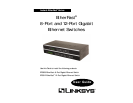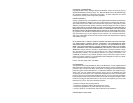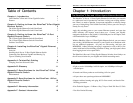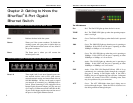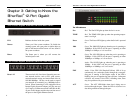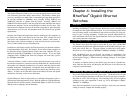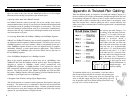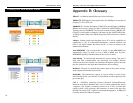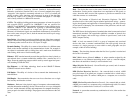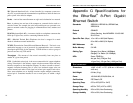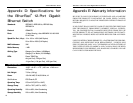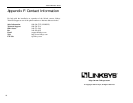
EtherFast
®
8-Port and 12-Port Gigabit Ethernet Switches
15
Instant EtherFast
®
Series
14
Appendix C: Specifications for
the EtherFast
®
8-Port Gigabit
Ethernet Switch
Standards IEEE 802.3, IEEE 802.3u, IEEE 802.3ab,
IEEE 802.3x
Protocol CSMA/CD
Ports 8 Auto-Sensing, Auto MDI/MDIX 10/100/1000
RJ-45 Ports
Speed Per Port (Mbps) 10 or 100 or 1000 (Half Duplex)
20 or 200 or 2000 (Full Duplex)
MAC Addresses 8K
Buffer Memory 512 KB
Cabling Type Category 5e or Better (1000Mbps)
Category 5 or Better (10/100Mbps)
LEDs Power, TEMP, Fan
Act (per Port), FDX (per Port)
10 (per Port), 100 (per Port), 1000 (per Port)
Dimensions 16.93" x 9.45" x 1.75" (430 mm x 240 mm x
44.5 mm)
Unit Weight 6.6 lbs. (3 kg)
Power 100-240 VAC, 50 W, 50-60Hz, 1A
Certifications FCC Class A, CE
Operating Temp. 0ºC to 40ºC (32ºF to 104ºF)
Storage Temp. -40ºC to 70ºC (-40ºF to 158ºF)
Operating Humidity 20% to 95%, Non-Condensing
Storage Humidity 20% to 95%, Non-Condensing
Environmental
NIC (Network Interface Card) - A board installed in a computer system, usu-
ally a PC, to provide network communication capabilities to and from that com-
puter system. Also called an adapter.
Packet - A unit of data routed between an origin and a destination in a network.
Port - A pathway into and out of the computer or a network device such as a
switch or router. For example, the serial and parallel ports on a personal com-
puter are external sockets for plugging in communications lines, modems and
printers.
RJ-45 (Registered Jack-45) - A connector similar to a telephone connector that
holds up to eight wires, used for connecting Ethernet devices.
STP - (Shielded Twisted Pair) Telephone wire that is wrapped in a metal
sheath to eliminate external interference.
TCP/IP (Transmission Control Protocol/Internet Protocol) - The basic com-
munication language or set of protocols for communications over a network
(developed specifically for the Internet). TCP/IP defines a suite or group of
protocols and not only TCP and IP.
Throughput - The amount of data moved successfully from one place to
another in a given time period.
UTP - Unshielded twisted pair is the most common kind of copper telephone
wiring. Twisted pair is the ordinary copper wire that connects home and many
business computers to the telephone company. To reduce crosstalk or electro-
magnetic induction between pairs of wires, two insulated copper wires are
twisted around each other. Each signal on twisted pair requires both wires.
Since some telephone sets or desktop locations require multiple connections,
twisted pair is sometimes installed in two or more pairs, all within a single
cable.



